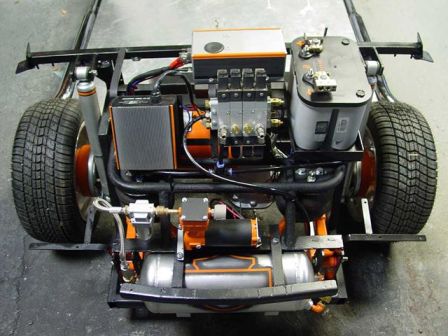In-wheel and near-wheel motors are coming in fast meaning four motors instead of one. Make that six on a large truck. Look up at the latest manned drones and one has 36 motors instead of one, fixed wing aircraft often planning 18 instead of one.
[dropcap]T[/dropcap]hat multiplier makes the EV motor business grow much faster than EVs themselves. The new report, “Electric Motors for Electric Vehicles 2020-2030 land, Water, Air” (www.IDTechEx.com/Motors), explains and predicts what comes next for 101 categories of EV land, water and air, hybrid and pure electric.
 Why are axial flux versions coming in fast in certain applications? Why is reluctance becoming much more of the picture in other applications? Escape routes from dysprosium price hikes? Why the acquisition frenzy? What is its focus? It is all here including a comprehensive directory of suppliers.
Why are axial flux versions coming in fast in certain applications? Why is reluctance becoming much more of the picture in other applications? Escape routes from dysprosium price hikes? Why the acquisition frenzy? What is its focus? It is all here including a comprehensive directory of suppliers.
This report is of vital interest to all in the electric vehicle value chain, from materials and component suppliers to parts and motor manufacturers, product integrators and vehicle manufacturers. It is essential reading for planners. Electric motors are the only components that appear in all electric vehicles.
Even batteries are sometimes replaced by supercapacitors. Every year, IDTechEx rewrites its definitive study of such motors. This year the assessment based on a large number of visits, interviews and event attendance is particularly important because so many things are sharply changing. New chapters reflect these changes.
Firstly, the Executive Summary and Conclusions, complete in itself, presents numerous new conclusions about the sales and technology trends. The proliferation of applications is reflected in the world’s most detailed forecasts for 101 categories of land, water and airborne vehicle over 12 years giving number, kWh and gross GWh for motors: 3636 data points.
Beyond that, the percentage of each motor technology for the 101 categories is given for 2020 and 2030 plus historical regional data. As an appendix, the motor activity of over 180 suppliers is appraised. Understand the many reasons why the number of motors per vehicle is proliferating, making the motor+controller demand grow faster than EV demand but that is partly offset by more vehicle manufacturers making their own motors.
The Introduction explains technology choices in lucid new infograms. Learn how and why for such choices as external vs internal rotor, synchronous vs asynchronous and subsets of that with the latest on which applications are now winning for each, where and why and the issues.
Reflecting the new realities, there is then a comprehensive Chapter 3 on 11 new trends in EV motors and their industry, one of which is new principles of electric propulsion. Chapter 4 explores current design issues with advice from the leaders and patent analysis. Learn here of the major new development of 48V mild hybrids and soon 48V full hybrids becoming a massive market of over 15 million yearly at peak for complex starter-motor-generators and sometimes two motor architectures. What vehicle brands, what countries? Chapter 5 “Axial flux for high power to weight ratio” focuses on the surge in adoption for axial flux motors – why and where – with profiles, patent and technology analysis. Chapter 6 is “In-wheel motors now popular” with reasons, players, and the contest between technologies here such as axial vs radial flux with profiles of activities.
There is a Chapter 7 on “Heavy duty EV motors off-road”, a newly large business for motors up to megawatts for land, water and air vehicles. That includes construction, agriculture, mining, military, marine and passenger aircraft being prepared for market and many out there already. Chapter 8 concerns the increasingly integrated motor control technology. Chapter 9 is a directory of the motors of 194 companies.
The 200 page report is replete with new graphs, tables, infograms and interview information, scoping around 200 organisations in all. It is based on over 20 years researching EV motors globally by PhD level analysts interviewing in local languages and distilling inputs from privileged databases including our own and our longstanding conferences and consultancy in the subject. The orientation is routes to commercial success and benefits to society not equations. See the future: no nostalgia about the past.



